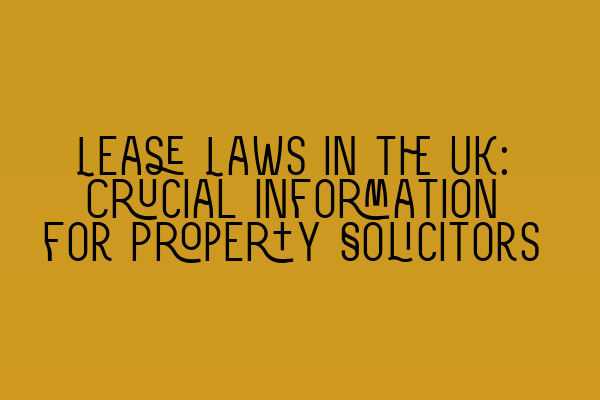Lease Laws in the UK: Crucial Information for Property Solicitors
Welcome to SQE Property Law & Land Law, where we specialize in providing expert advice and assistance on lease laws in the UK. As a property solicitor, understanding the intricacies of lease laws is essential to successfully representing your clients. In this blog post, we will delve into the important aspects of lease laws in the UK that every property solicitor should be familiar with.
What is a Lease?
A lease is a legal agreement that grants a tenant the right to use and occupy a property for a specific period of time. This agreement outlines the responsibilities and obligations of both the landlord and the tenant. It is crucial to have a clear and comprehensive lease in place to avoid disputes and ensure a smooth tenancy.
Types of Leases
In the UK, there are various types of leases, each with its own specific requirements and regulations. Let’s explore some of the most common types:
Assured Shorthold Tenancies (ASTs)
ASTs are the most common type of residential tenancy in the UK. These are usually used for private rented properties and are subject to specific rules and regulations.
Commercial Leases
Commercial leases are used for renting out properties for business purposes. These leases often have more complex terms and may require additional legal considerations.
Ground Leases
Ground leases are commonly used for leasing land. The tenant is usually responsible for building structures on the land and the landowner retains ownership.
Important Considerations for Property Solicitors
As a property solicitor, it is crucial to be well-versed in lease laws and understand the key considerations that arise during lease negotiations and drafting. Here are some important aspects to keep in mind:
Lease Termination and Renewal
Understanding the procedures and legal requirements for lease termination and renewal is essential. This includes serving notices, determining the appropriate notice periods, and ensuring compliance with statutory provisions.
Rent Reviews
Rent reviews are a common feature in leases, especially for commercial properties. Property solicitors must be familiar with the different methods of rent review, such as upwards-only rent reviews and market rent reviews.
Repair and Maintenance Obligations
Leases often include provisions regarding the repair and maintenance responsibilities of both the landlord and the tenant. Ensuring these obligations are properly defined and understood is crucial for avoiding future disputes.
Break Clauses
Break clauses allow either party to terminate the lease prematurely. Property solicitors must be familiar with the terms and conditions surrounding break clauses and advise their clients accordingly.
Alterations and Subletting
Tenants may want to make alterations to the property or sublet part of it. Understanding the restrictions and permissions required under the lease is vital to avoid breaching the terms of the agreement.
Conclusion
Lease laws in the UK are complex, and as a property solicitor, it is crucial to have a comprehensive understanding of the legal framework and considerations involved. By being well-versed in lease laws, you can provide your clients with expert advice and ensure their best interests are protected throughout the lease process.
Contact SQE Property Law & Land Law for expert legal assistance and guidance on lease laws in the UK. Our team of experienced solicitors is here to support you.
Related Articles:
- SQE 1 Practice Exam Questions
- SQE 1 Practice Mocks FLK1 FLK2
- SQE 2 Preparation Courses
- SQE 1 Preparation Courses
- SRA SQE Exam Dates
